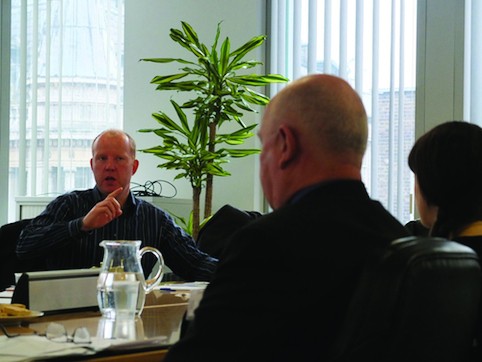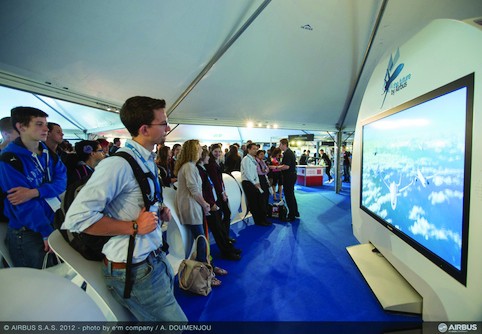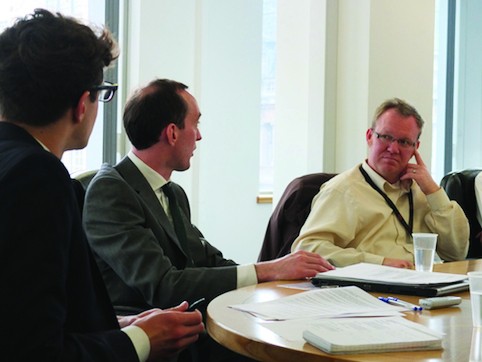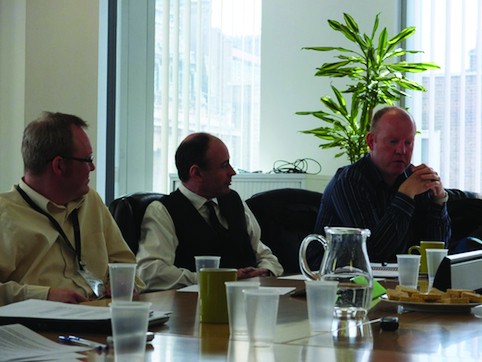
Britain is being held back by a major shortage of science and engineering students, or so we are told on what seems like an increasingly frequent basis. Yet ask most recent graduates whether they’ve found it easy to get a job in engineering and they’ll probably tell you that competition is fierce. To explore what’s really going on in graduate recruitment and to try to identify some possible solutions, The Engineer convened a roundtable panel from across the engineering community. The discussion covered the reasons behind the skills mismatch what can be done to address it, but began with an examination of how widespread the problem actually is.
The picture that quickly emerged was of an uneven jobs market, in which large, well-known firms have both the natural pull and the marketing budgets to attract huge numbers of applications, leading many graduates to end up fighting over the same few jobs. The smaller companies, meanwhile, especially those in more rural locations and less well-understood product areas, struggle to get enough applicants just to fill their roles, let alone compete for the best engineers. ‘It’s a huge problem,’ said Bob Gregory, training manager for medium-sized precision manufacturer HepcoMotion. ‘We are in a fairly rural and remote part of Devon and there’s a lot of reluctance among graduates to relocate to where we are.’
The problem is even more severe when it comes to more specialised skills such as nuclear engineering, where the problem also starts to affect the larger firms. Geoff McFarland, group engineering director of Renishaw, explained how the company was forced to divest its acquired MRI equipment division after failing to find people with the right expertise to take it forward. ‘The only ones available were from overseas,’ he said.

However, despite a few comments about graduates missing certain technical skills and the difficulty SMEs have in offering additional training, there was a general consensus that the skills issue was more about quantity than quality of candidates and an acceptance that young people at the start of their careers would inevitably be inexperienced. ‘The ones that we do get are of high quality and they learn quickly,’ said Gregory. ‘We don’t expect them to come to us with a good working knowledge of SolidWorks or any other 3D modelling software. It’s merely a supply problem.’
In fact, the number of science and engineering graduates is low enough to worry even the biggest firms, which are currently able to fill their vacancies without trouble but are acutely aware of the competition from other sectors. ‘We do anticipate that with the economy strengthening we will have more challenges,’ said Richard Hamer, education director for BAE Systems. ‘When the City is demanding more numbers we’ll find more competition for graduates.’
Sector competition
So why aren’t more people entering the engineering profession? One key suggestion was that students don’t really understand the full range of opportunities available in the sector. ‘Engineering’s competing with so many other pulls from sectors that are a lot more vocal,’ said Keith Lewis, managing director of engineering recruitment agency Matchtech. ‘People within engineering are very poor at promoting it and making lots of noise about it.’ It’s a particular problem for SMEs, he added, which tend to operate in niche areas but also have smaller marketing and recruitment budgets. ‘Companies that can afford to are looking at where those people might be coming from and setting up small offices to capture them. SMEs can’t afford to do that.’
Rhys Morgan, director of engineering and education at the Royal Academy of Engineering, agreed that engineering firms weren’t selling themselves well enough compared to other employers that target engineering graduates, such as financial and professional service firms. ‘The major [engineering] employers only go to the top 10-to-15 universities,’ he said. ‘All the banks and all the accountancy firms are very visible on all the campuses and they make it very attractive for engineering graduates to think “I’ll go there”.’

However, there is also a lack of understanding of what even the better-known companies actually do, which doesn’t just put people off from applying but also disadvantages those who do wish to stay in the sector. ‘If people don’t know which area of engineering they want to go into, they won’t know which companies to apply to and what to put in their applications,’ said Rosie Tomlinson, a graduate mission systems engineer for Airbus Defence and Space (formerly Astrium). ‘Some people apply for the top 10 companies, they don’t get a job so they give up.’
The wider perception of engineering may also have an impact. The panel had little support for the idea that people were put off by ‘low’ pay, given that engineering graduate jobs tended to offer considerably more than the average starting salary of £20,000, but agreed this fact wasn’t always well conveyed. ‘There’s a lot more we could do to sell that,’ said Hamer. ‘Sometimes in the press they exaggerate the small number of graduates who get jobs at Goldman Sachs earning £60,000 but the number who do that is minute. Whereas in our sector there are schemes where you can earn £30,000 or more as a starting graduate.’
There was also a recognition that more could be done to promote the possibilities for career development. ‘As careers progress the number of senior engineers with that title starts to diminish and they go into other roles: the fact that they’re engineers starts being lost,’ said John Mitchell, director of the integrated engineering programme at University College London.
Industry solutions
Aside from increased marketing, one way to increase graduates’ awareness of engineering career options may be to widen the availability and take-up of industrial placements, which only a minority of students undertake. Mitchell said universities also had a role in helping promote careers at SMEs. ‘We’ve got very good relationships with the sorts of people who already have very well-developed schemes for attracting graduates but how we can help the smaller companies? A lot of the onus has been on supporting students if they make the first move but actually I’m not sure we’ve stepped up to the mark to put in enough real support.’
Another possibility would be for the larger firms to work more closely with their SME suppliers. Hamer said the aerospace industry was already looking at how big companies could pass on surplus job applicants. ‘We’ve got an oversupply of candidates: why not train more of them — with government money — and then provide them to small companies?’ Bob Gregory of HepcoMotion agreed it was an idea he would like to explore. ‘A lot of our customers are actually universities and it would supply an ideal network for that,’ he said.

However, even if all these issues were addressed and 100 per cent of engineering graduates went into industry (a questionable aim in itself), we still wouldn’t have addressed the skills shortage we’re told companies are facing. In short, we need more engineering students. And this can’t be addressed just by engaging more with young people, said Morgan. ‘Universities are almost at capacity,’ he said. ‘So even if we did get more students coming through to study STEM [science, technology, engineering and maths] subjects, we’re not going to have the capacity. There’s a real timebomb coming up.’
Given the current state of public finances, one solution may be a greater roll-out of higher apprenticeships, which all the employers on the panel already use. These offer a work-based route to a degree through part-time, employer-supported study and could be particularly useful to those employers not located near big university cities or that have very specific skill requirements. ‘If we’ve taken on someone who’s been through that programme they’re actually more likely to stay with us than jump ship,’ said Renishaw’s Geoff McFarland. ‘Whereas engineers who’ve studied in, say, Newcastle and join us in Gloucestershire have already moved once and there’s nothing to stop them moving again.’
However, the panel concluded that if the government was serious about addressing the skills issue, it needed to help universities invest the necessary money to expand. ‘We need more students to recognise that if they’re doing an engineering degree there’s a really interesting, exciting, creative, design-focused valuable lifelong career in engineering for them that they’ll be so stimulated by, much more so than working in the financial sector,’ said Morgan. ‘But we also need to be very clear to government that we need it to invest in engineering higher education to increase capacity.’
The Participants
Bob Gregory, training manager, HepcoMotion
Richard Hamer, education director, BAE Systems
Keith Lewis, managing director, Matchtech
Geoff McFarland, group engineering director, Renishaw
John Mitchell, director of the integrated engineering programme, University College London
Rhys Morgan, director of engineering and education, Royal Academy of Engineering
Rosie Tomlinson, graduate mission systems engineer, Airbus Defence and Space

Report highlights significant impact of manufacturing on UK economy
Note to Evil Villain/Dave 2020. Thatcher was PM for _11_ years, from 1979 to 1990 so no one under the age of 34 was even born when she left office....